
Cheney apologizes for Republicans who questioned general’s loyalty to Constitution

Rep. Liz Cheney apologizes for Republicans who questioned Gen. Milley’s loyalty to US Constitution
From CNN’s Ellie Kaufman and Core James
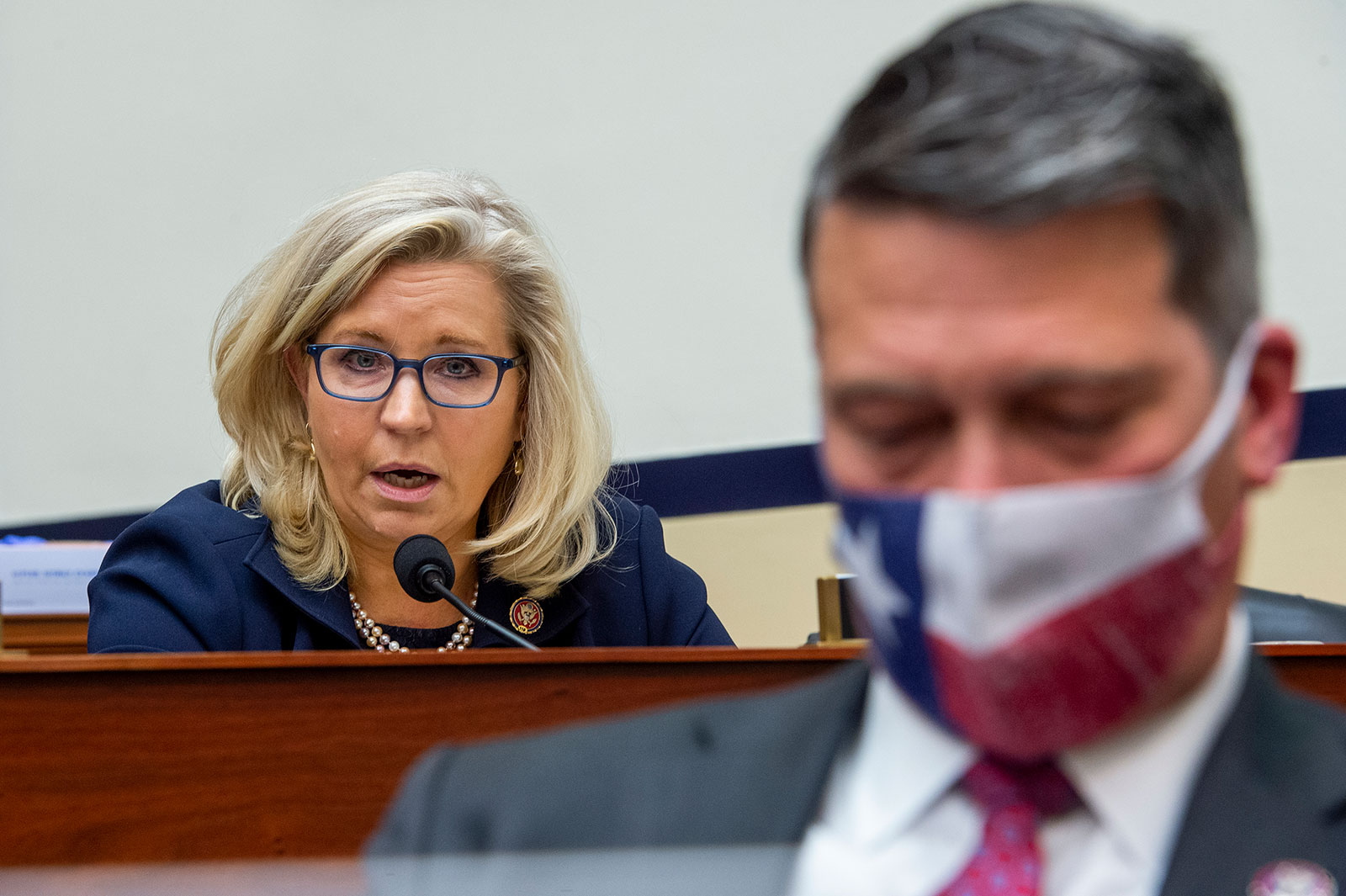
Rep. Liz Cheney, a Republican from Wyoming, apologized for members of the Republican party who have questioned Gen. Mark Milley, chairman of the Joint Chiefs of Staff, during a House Armed Services Committee hearing on Wednesday.
Cheney referenced the insurrection on the Capitol on Jan. 6, calling it an “effort to stop the constitutionally prescribed process of counting electoral votes.”
She said it was “the first time in our nation’s history that we did not have a peaceful transfer of power.”
“General Milley you found yourself in your constitutionally prescribed role, standing in the breach. And for any member of this committee for any American to question your loyalty to our nation to question your understanding of our Constitution, your loyalty to our Constitution, your recognition and understanding of the civilian chain of command is despicable,” Cheney said.
“I want to apologize for those members of this committee,” she added.
Watch the moment:
Milley says he was not consulted on Trump’s November order to withdraw all troops from Afghanistan
From CNN’s Jennifer Hansler
Mark Milley, chairman of the Joint Chiefs, told lawmakers Wednesday he was not consulted on President Trump’s Nov. 11 order to withdraw all US forces from Afghanistan by mid-January.
“I wasn’t consulted on the 11 November order that I received,” Milley said, noting he went to the White House with Acting Defense Secretary Chris Miller and Kash Patel “to discuss that order.”
Asked if he had been consulted on the Trump administration’s decision “to open negotiations solely with the Taliban to the exclusion of the Afghan government,” Milley said he was told “very, very late in the game,” just days before the signing of the Doha Agreement.
Milley said he “dutifully executed” the drawdown plans outlined in that agreement.
He and the head of the US Central Command Gen. Frank McKenzie told the House Armed Services Committee that they developed plans for non-combatant evacuation operation (NEO) but those plans did not initially account for large-scale evacuations of Special Immigrant Visa (SIV) holders.
“We had a plan to bring out mainly American citizens and people associated with the embassy. Planning later began to encompass the larger population, the at-risk Afghan population, the SIV population. But initially, to like every other plan, it’s centered on American citizens and their families,” McKenzie said.
He said planning for evacuated the larger population began “no later than early spring of this year.”
Top military officials say they knew civilians were killed in US drone strike hours after it occurred
From CNN’s Ellie Kaufman
Secretary of Defense Lloyd Austin, Chairman of the Joint Chiefs of Staff Gen. Mark Milley and the top general of US Central Command Gen. Frank McKenzie all said they knew that civilians had been killed in a US drone strike in Kabul hours after the strike occurred and it was days later when they knew the strike was an error.
Since the strike, the US military acknowledged that the strike did not hit an ISIS target but targeted civilians, killing ten people, including seven children. The strike took place on Aug. 29 in Kabul.
McKenzie said they did not know the strike was an “error” until a few days later, but they did know civilians were killed a few hours after the strike.
“Well, so, we knew the strike hit civilians within four or five hours after the strike occurred. And US central command released a press release saying that. We did not know the target of the strike was an error, a mistake until some days later, but we knew pretty soon,” McKenzie said.
Milley says he doesn’t regret speaking to Woodward, says he has done his “best to remain” apolitical
From CNN’s Michael Conte
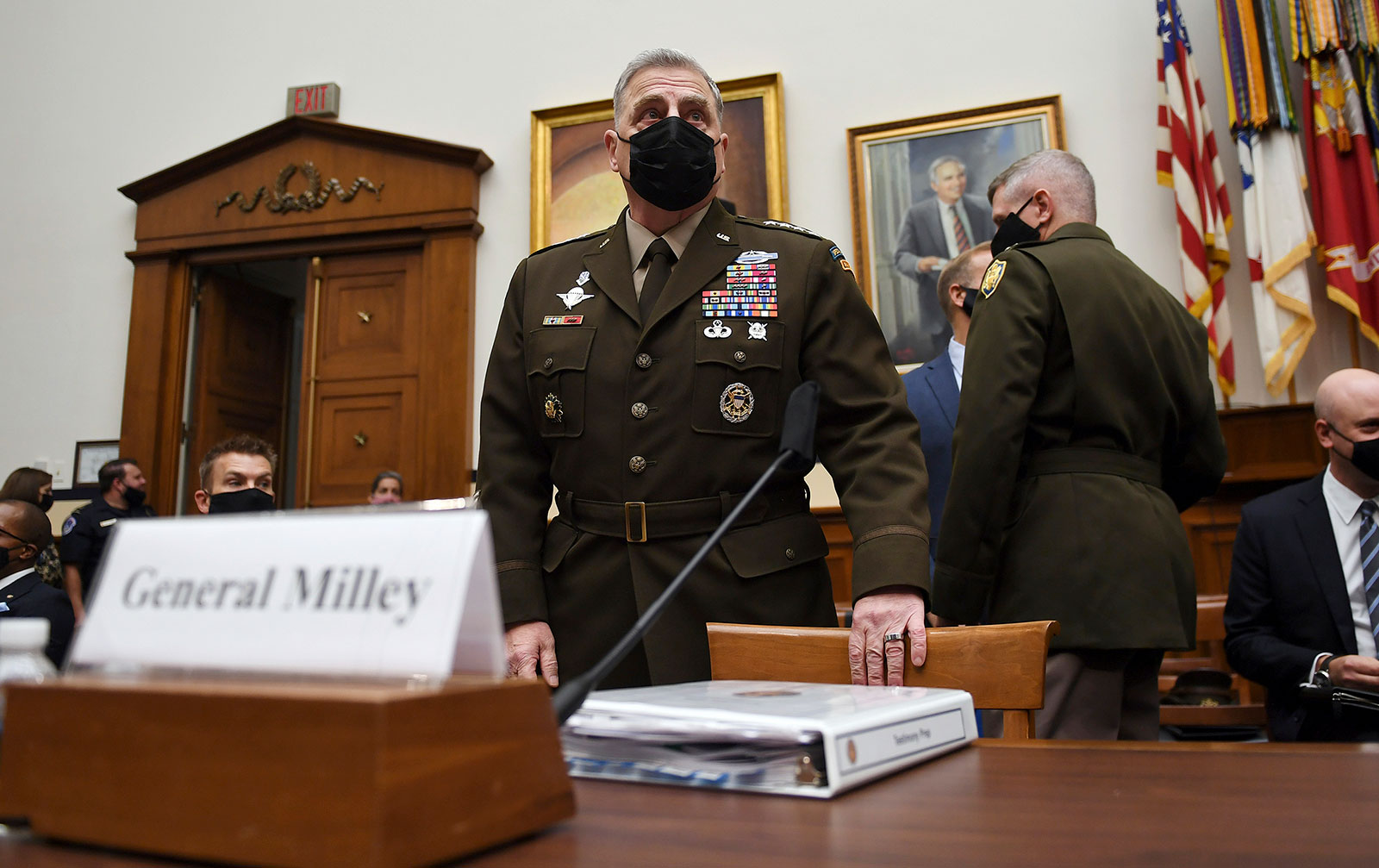
Joint Chiefs Chairman Gen. Mark Milley said that he is “concerned” that Bob Woodward’s book may mischaracterize him as being willing to “become politicized,” a characterization he disputes.
“I have done my best to remain personally apolitical, and to try to keep the military out of actual domestic politics, and I made a point of that from the time I became the chairman and especially beginning last summer,” Milley said at a House Armed Services hearing on Afghanistan.
Asked by GOP Rep. Jim Banks if he regretted speaking to Woodward, Milley said he did not.
“I think that it’s important for me to speak to the media,” he said. “I am trying to stay apolitical, and I believe I am.”
“Many” Taliban prisoners released under Doha agreement rejoined the Taliban, Secretary of Defense says
From CNN’s Jennifer Hansler
Secretary of Defense Lloyd Austin indicated that the Doha agreement allowed the Taliban to gain strength, telling House lawmakers that “many” Taliban prisoners, who were released by the Afghan government as a condition of the deal, went back to join the ranks of the militant group.
“As a part of that agreement, we agreed to cease conducting air operations against the Taliban. So the Taliban got stronger. They increased their offensive operations against the Afghan security forces. And the Afghans were losing a lot of people on a weekly basis,” he said at a House Armed Services Committee hearing.
“In addition to that, we caused them to release 5,000 prisoners and those prisoners, many of those prisoners, went back to fill the ranks of the Taliban. So they got a lot stronger, they continued their attacks, we got smaller,” he said.
According to the text of the Feb. 2020 agreement, which was not signed by the Afghan government, up to 5,000 Taliban prisoners and up to 1,000 “prisoners of the other side will be released by March 10, 2020, the first day of intra-Afghan negotiations.”
In the months following the deal, US Special Representative for Afghanistan Zalmay Khalilzad repeatedly pressed for the sides to release the prisoners as a means to pave the way toward the start of intra-Afghan negotiations.
Former Secretary of State Mike Pompeo said in Aug. 2020, “We acknowledge that the release of these prisoners is unpopular. But this difficult action will lead to an important result long sought by Afghans and Afghanistan’s friends: reduction of violence and direct talks resulting in a peace agreement and an end to the war.”
“After 40 years of war and bloodshed and destruction, the parties are ready to embark on a political process to reach a negotiated settlement,” he said.
Top US general: “Real possibility” al Qaeda or ISIS could reconstitute in next 6-36 months in Afghanistan
From CNN’s Jennifer Hansler and Christian Sierra
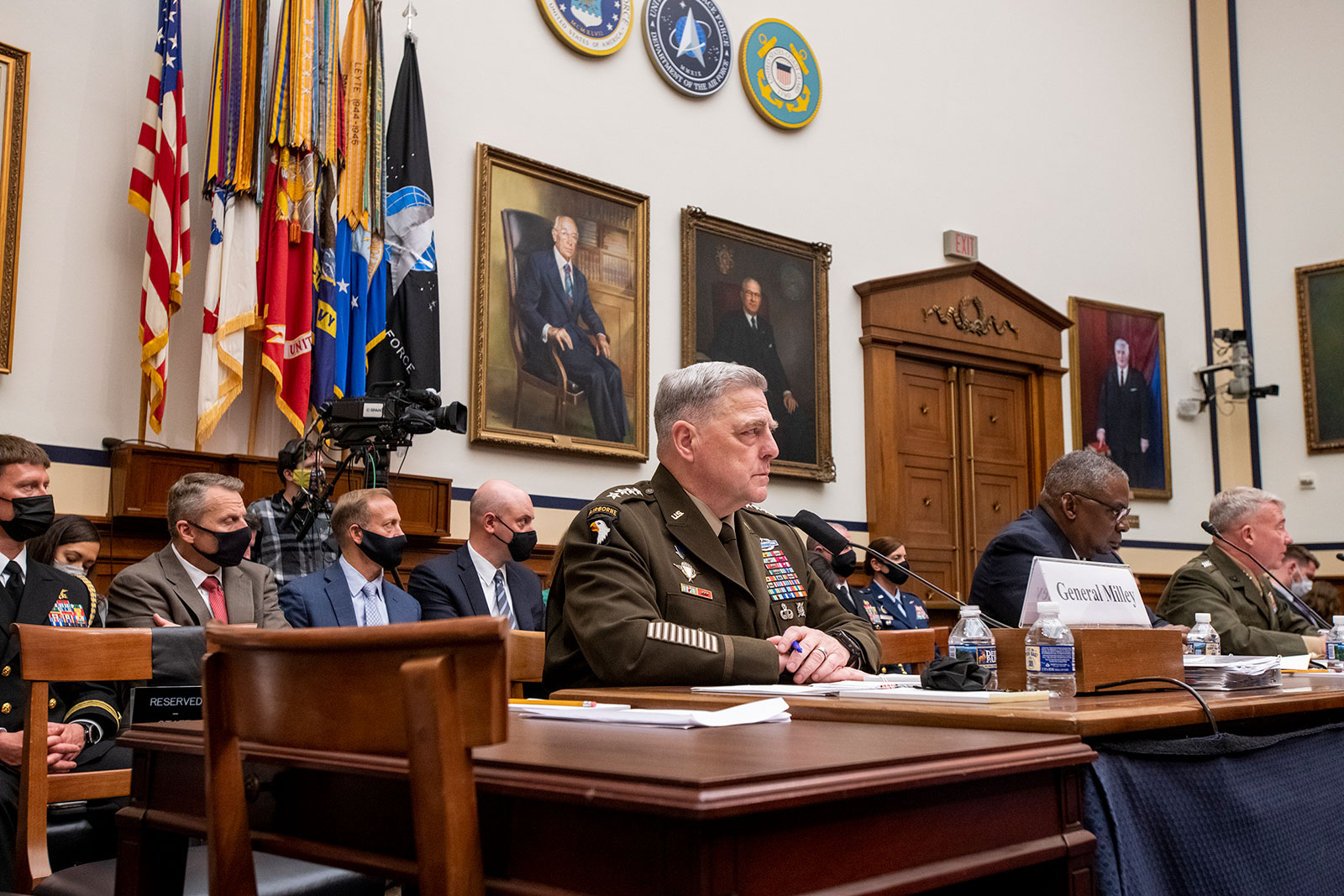
Gen. Mark Milley, chairman of the Joint Chiefs, said Wednesday there is “a real possibility” that al Qaeda or ISIS could reconstitute in Afghanistan in the next six to 36 months.
Milley said that “right this minute” the terrorist threat from Afghanistan is smaller than it was on 9/11, but that “the conditions could be set for a reconstitution of al Qaeda and/or ISIS.”
“It’s a real possibility in the not too distant future, 6, 12, 18, 24, 36 months that kind of timeframe for reconstitution of al Qaeda or ISIS and it’s our job now, you know, under different conditions, but it’s our job to continue to protect the American citizens against attacks from Afghanistan,” he told lawmakers at a House Armed Services Committee hearing.
Secretary of Defense Lloyd Austin concurred with that assessment.
“Al Qaeda has been degraded over time. Now, terrorist organizations seek ungoverned spaces so that they can train and equip and thrive and, and so, there, there is clearly a possibility that that can happen here, going forward,” he said.
20-year Afghanistan war “wasn’t lost in the last twenty days or even twenty months,” Milley says
From CNN’s Ellie Kaufman
Gen. Mark Milley, chairman of the Joint Chiefs of Staff, said the war in Afghanistan, which spanned 20 years, “wasn’t lost in the last twenty days or even twenty months for that matter,” during a congressional hearing about the US withdrawal from the country on Tuesday.
“There’s a whole series of decisions that take place over twenty years. I don’t think that whenever you get some phenomena like a war that is lost, and it has been in the sense of we accomplished our strategic task of protecting America against al Qaeda, but certainly the end state is a whole lot different than what we wanted,” Milley said.
Milley said there are “an awful lot of causal factors” to why the war in Afghanistan ended the way it did, and “we’re gonna have to figure that out.”
“A lot of lessons learned here,” he added.
Milley: Intel that led to his China call during Trump administration was in President’s daily briefing
From CNN’s Michael Conte
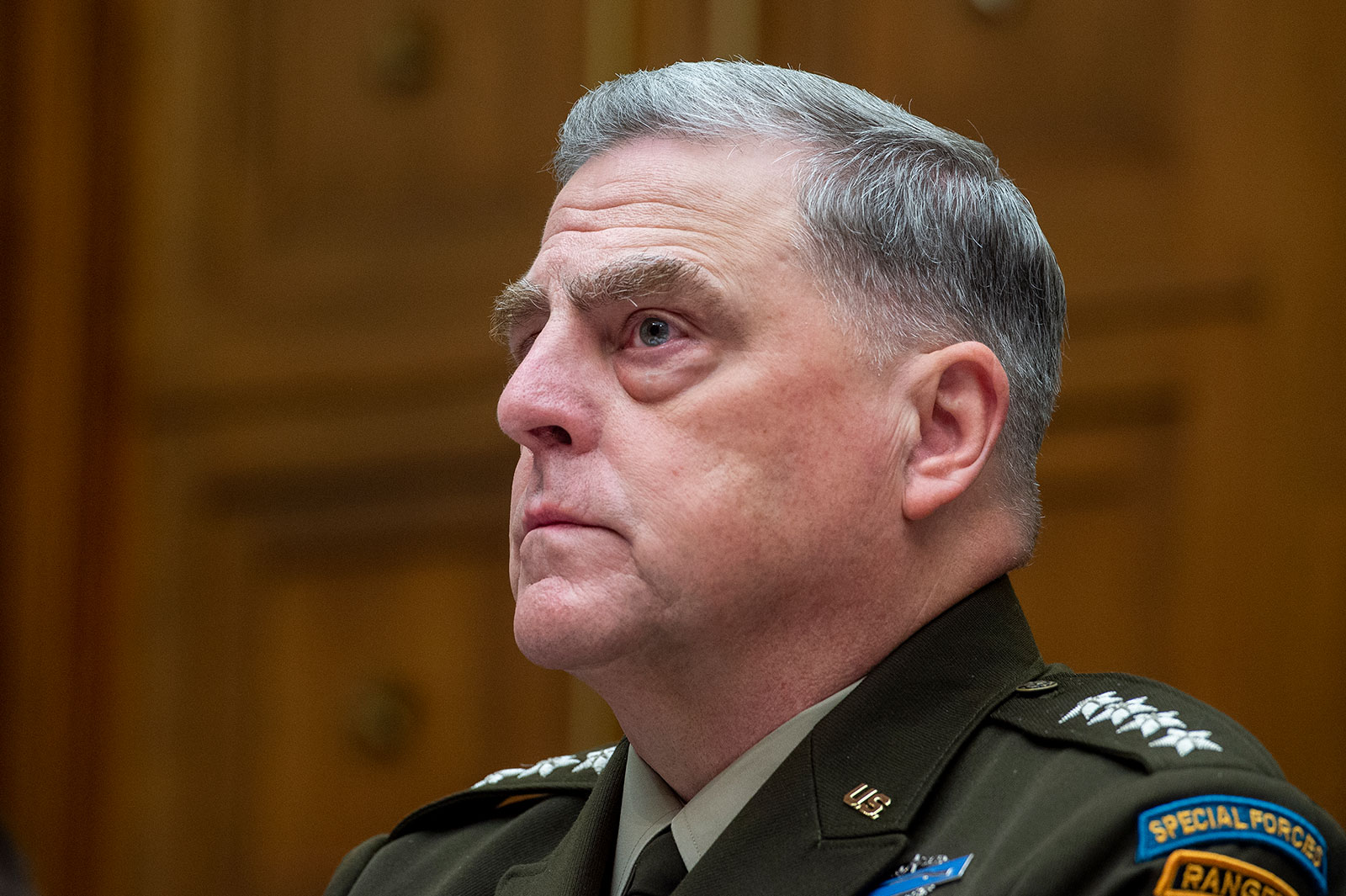
Joint Chiefs Chairman Gen. Mark Milley told lawmakers that the intelligence that led to then-Defense Secretary Mark Esper directing Milley to call his Chinese counterpart in the final days of the Trump administration to assure him that the US was not preparing to attack China had been disseminated across the highest levels of the administration, including in the President’s daily intelligence briefing.
“I guarantee that that intelligence was disseminated in the President’s PDB, the Vice President, the DNI, Director of CIA, the Secretary of Defense, the Assistant to the President for national security affairs, and others,” said Milley at a hearing on Afghanistan with the House Armed Services Committee. “That was significant, and there was a lot of it. It wasn’t just a singular report.”
Milley was responding to an accusation by GOP Rep. Michael Turner that he had not made Esper aware of the call until after it had happened.
“You chose to talk to reporters instead of us, and that’s of great concern,” said Turner. “No one in Congress knew that one of two of the major nuclear powers thought that they were perhaps being threatened for attack.”
Turner asked Defense Secretary Lloyd Austin if he learned of such intelligence whether he would “elevate that to the Cabinet and to Congress,” to which Austin replied that he would “follow standard protocol” and consider such actions.
Austin also defended Milley, saying, “what I heard him say yesterday and I think again today, is that his chain of command, the Secretary of Defense at the time was, was aware of the actions.”
Milley said he would be “happy” to share the intelligence with Turner “and go over it with you line by line.”
“This is all done with oversight, and I tried to lay that out in the memoranda,” said Milley. “I tried to lay it out in a timeline in an unclassified way.”
Decision to reduce number of troops in Afghanistan to 650 was made in “consultative process,” Milley says
From CNN’s Ellie Kaufman and Christian Sierra
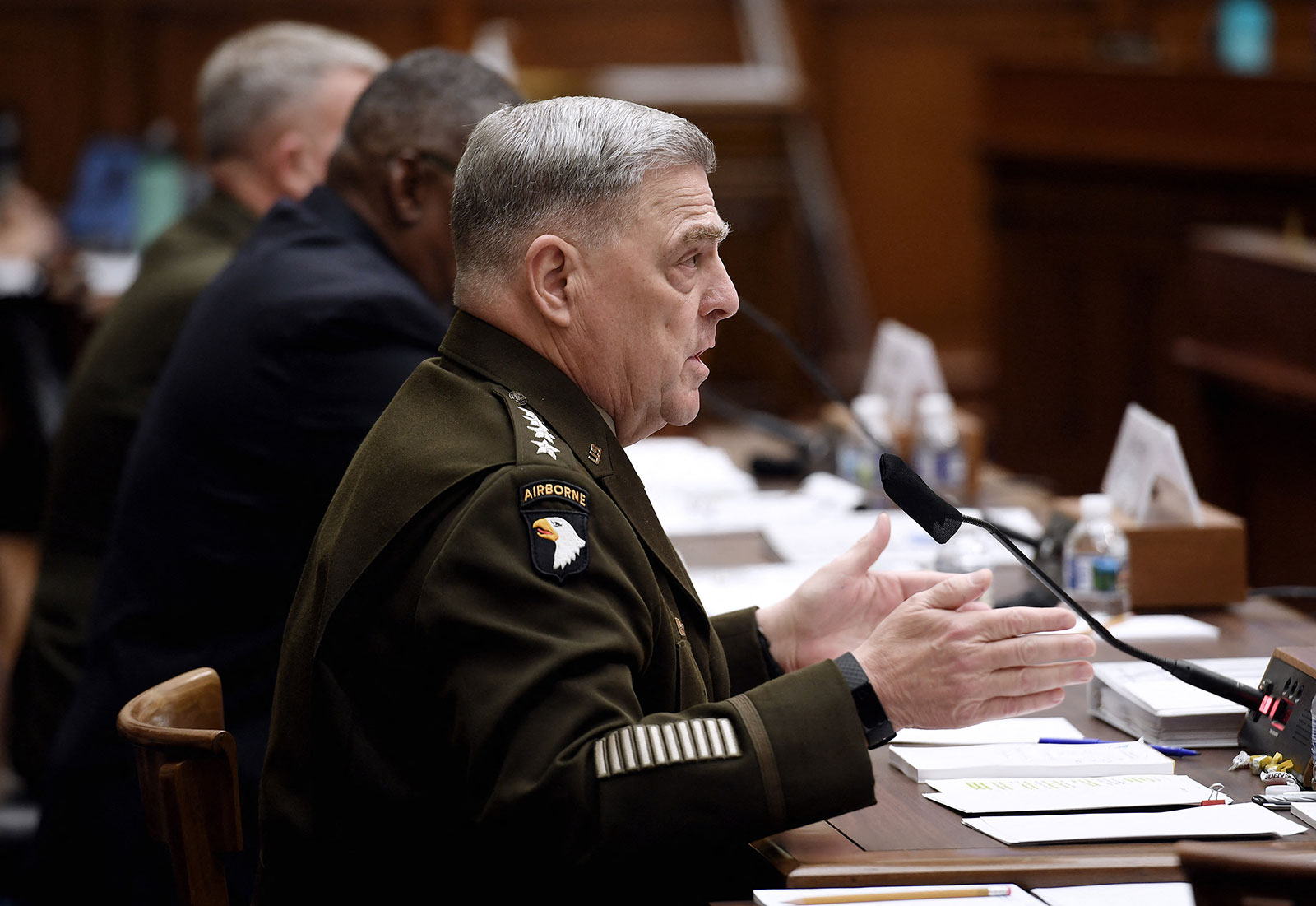
Gen. Mark Milley, chairman of the Joint Chiefs of Staff, said that while his assessment was to maintain a presence of 2,500 US troops in Afghanistan, the decision to reduce the troop levels to 650 was made in “consultative process by the highest levels” of the government.
“I would say that the decision was made in a national security consultative process by the highest levels of our government,” Milley said.
Gen. Frank McKenzie, the top general of US Central Command, said his view was also to keep 2,500 US troops in Afghanistan, and his opinion did not change.
“My view was that we needed to maintain about 2,500, and that we also needed to work with our coalition partners who had about 6,000 troops in there, NATO and other core countries that would, that would remain there,” McKenzie said.
McKenzie later in the hearing said that 2,500 service members was the minimum number that would’ve been needed to retain Bagram Air Base.
“It has been my view that I recommended a level of 2,500, a level that would have allowed us to hold Bagram and other airfields as well. Once you go below that level and make a decision to go to zero, it is no longer feasible to hold Bagram,” he said.
Source: http://rss.cnn.com/~r/rss/cnn_topstories/~3/_ycybak7PnU/h_47672a55444af4100b63c56c8b4af38c

















